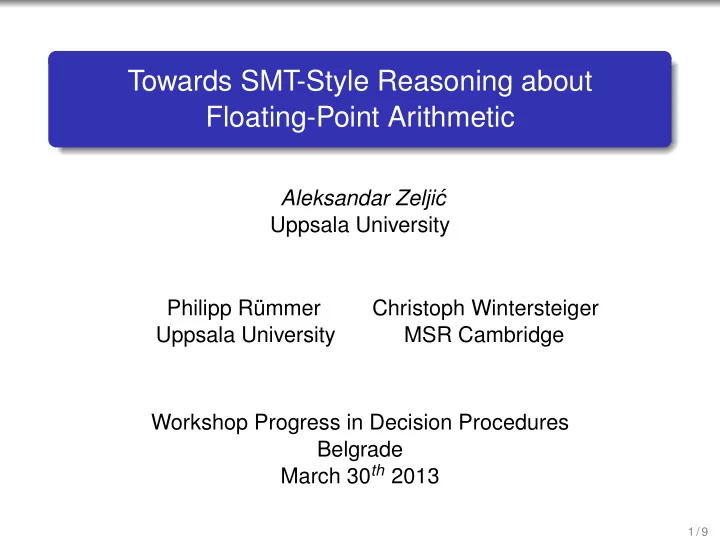

Towards SMT-Style Reasoning about Floating-Point Arithmetic Aleksandar Zelji´ c Uppsala University Philipp Rümmer Christoph Wintersteiger Uppsala University MSR Cambridge Workshop Progress in Decision Procedures Belgrade March 30 th 2013 1 / 9
Motivation Verification of software using FPA Provide tools for embedded systems development Reasoning about FPA SMT enables reasoning in various domains Apply the SMT approach to FPA 2 / 9
Some existing approaches Interval reasoning [Haller et al., FMCAD ’12] Interval propagation Abstract interpretation Uses generalization of conflict analysis algorithm Good for proving unsatisfiability Not good at computing models Encoding as bit-vector arithmethic [Brillout et al., FMCAD ’09] Translation to BVA uses knowledge of hardware implementations Uses bit-blasting to reduce BVA to propositional logic 3 / 9
Challenges Bit-blasting Introduce new boolean variables Add constraints over introduced variables to the formula Bit-blasting is often time- and memory-consuming Multiplication can take 25000 variables Subsequent reasoning can be very quick by comparison 4 / 9
Approximations and Model refinement Use of approximations in encodings would be beneficial Generate a model that can be refined Types of approximation Under-approximations Over-approximations Computation with reduced precision 5 / 9
Approximations and Model refinement Refinement loop while(1) { bvProb = appFpa2bv(fpaProb,appLevel); propProb = bitBlast(bvProb); model = getModel(propProblem); if(!model || !satisfies(model,fpaProb)) appLevel++; else output(model); } 6 / 9
Approximating FP operations Division uses an iterative algorithm Over-approximate by fixing the number of iterations FPA is always performed with a given precision All operations can be performed with a smaller precision Removing rounding could also be a form of approximation 7 / 9
Future work Evaluate the outlined ideas Come up with different operation schemes Look into generation of robust models Investigate lazy assertion of constraints Implement a theory solver for FPA 8 / 9
Thanks for your attention! 9 / 9
Recommend
More recommend